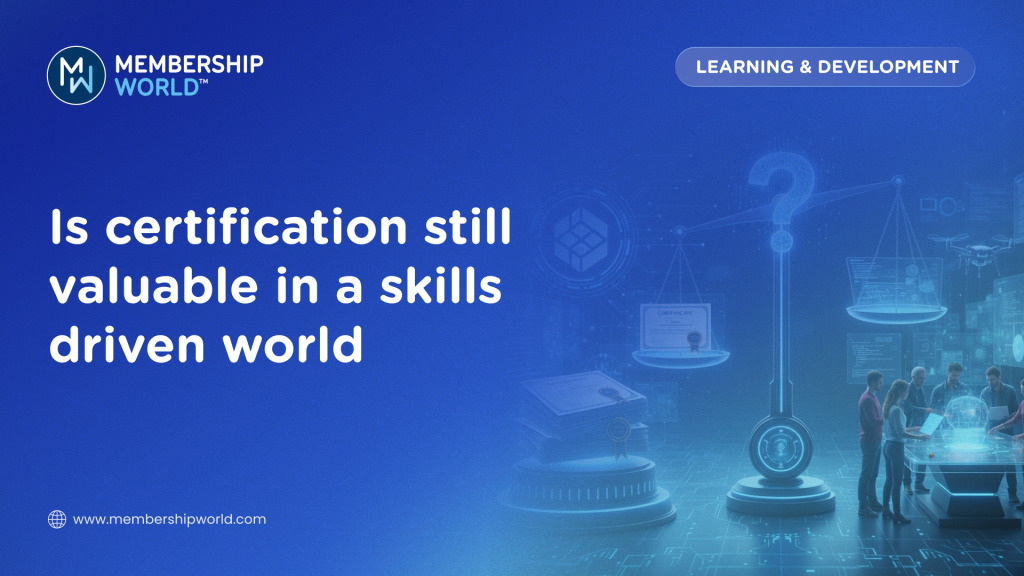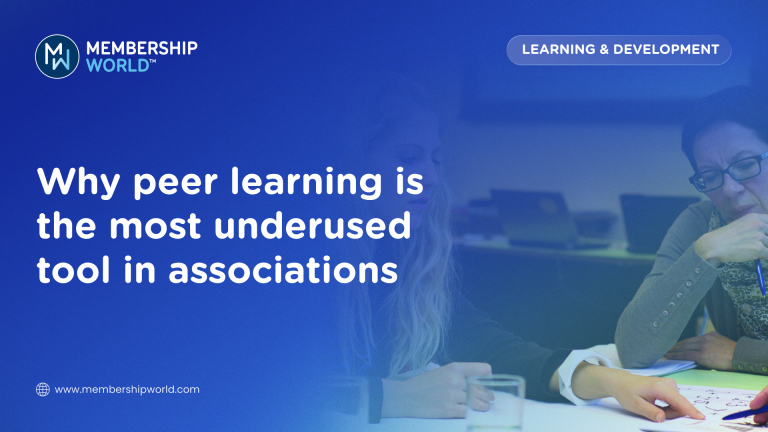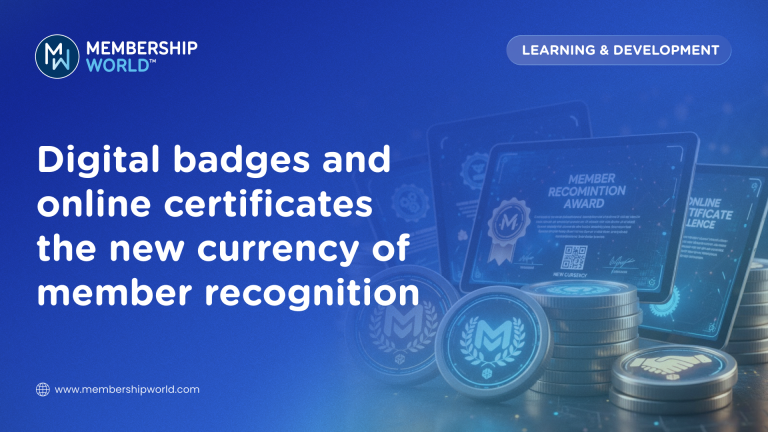
For decades, certifications have been one of the most trusted ways for professionals to prove expertise, advance careers, and gain credibility.
But the world of work is changing — faster than most credentialing systems can keep up with.
Employers are shifting from “What degree do you have?” to “What can you actually do?”
Members are prioritising practical skills over long formal programmes.
And new alternatives — micro-credentials, digital badges, skill assessments — are becoming mainstream.
So where do certifications fit in a world where skills have become the new currency?
Surprisingly, certifications aren’t disappearing.
They’re evolving — and associations have a crucial role to play.
TLDR
- Certifications still matter, but their value now depends on how relevant, flexible, and skills-focused they are.
- Members want credentials that prove real capability — not just course completion.
- Micro-credentials and digital badges are complementing, not replacing, traditional certifications.
- Associations must adapt their credentialing models to stay competitive in a skills-first economy.
- The future belongs to learning pathways, stackable credentials, and visible proof of competence.
Why certifications became powerful in the first place
Certifications built their reputation on three things:
- Validation — an external authority confirming someone can do a job.
- Standardisation — ensuring consistent skills across a profession.
- Mobility — helping professionals move industries, countries, or career stages.
Associations were — and still are — the natural stewards of these standards.
But the expectations around how people gain and demonstrate competence have shifted dramatically.
The rise of the skills-first economy
Across sectors, employers now openly prioritise skills over traditional credentials.
Research from LinkedIn, SHRM, and WEF shows the same trend: companies want people who can demonstrate capability today — not just qualifications earned years ago.
This skills-first movement is driven by:
- Rapid industry change
- Technology disruption
- Shorter skill cycles
- A need for continuous learning
Professionals want learning experiences they can immediately use. They want credentials that evolve with them — not ones that expire quietly on a CV.
So the question isn’t “Are certifications still valuable?”
It’s “Are they keeping up with how people learn, work, and prove competence?”
The new expectation: certifications must become skills-proof
Members today want certifications that:
- Reflect the realities of their job
- Prove practical competence, not just theoretical knowledge
- Update regularly as industries evolve
- Connect to clear career outcomes
- Are flexible enough to be earned in smaller steps
Associations that embrace these expectations will see certification demand rise, not fall.
Why certifications still matter — when done right
Even in a skill-first market, certifications remain powerful because they offer:
1. Trust
A respected association’s certification carries credibility that self-claimed skills cannot match.
2. Structure
Learners value a clear pathway rather than a scattered set of micro-courses.
3. Recognition
Employers still rely on certifications when hiring, promoting, and benchmarking capabilities.
4. Community
Certification creates a sense of belonging to a professional identity or standard.
But these benefits only matter if certifications evolve with the times.
The rise of micro-credentials — and why they complement certification
Micro-credentials have surged in popularity because they match how professionals learn today:
- Bite-sized
- Stackable
- Immediately applicable
- Often cheaper and quicker
Associations don’t need to choose between certifications and micro-credentials.
They work best together.
Here’s how:
- Micro-credentials can serve as building blocks toward a larger certification.
- They help learners show progress along the way, not just at the end.
- They give members visible achievements that can be shared online or with employers.
This model makes certification pathways more flexible, accessible, and engaging.
Digital badges — the visibility layer members now expect
Badges have become a powerful tool for recognition because they:
- Are instantly shareable on LinkedIn and CVs
- Showcase skills, not just participation
- Include metadata that employers can verify
- Encourage members to keep learning
Many associations still underestimate how motivating badges are — especially for early- and mid-career professionals.
In a digital world, visibility is value.
How associations must evolve their certification models
To remain relevant, associations will need to:
1. Move from knowledge-based to skills-based assessments
Case studies, practical tasks, and competency demonstrations are replacing multiple-choice tests.
2. Offer modular, stackable learning pathways
Members should be able to earn credentials at their own pace — micro first, certification next.
3. Refresh content more frequently
Annual or biannual updates aren’t enough in fast-moving industries.
4. Embed work-integrated learning
Real-world projects, peer feedback, and portfolio submissions add meaningful depth.
5. Prioritise accessibility
Flexible formats, digital-first delivery, and asynchronous pathways make credentials more inclusive.
Case insight: Rethinking the certification journey
One association (name withheld) rebuilt its flagship certification around a competency-based model.
What changed?
- Assessments focused on what members can do, not what they remember.
- The program introduced stackable badges that built toward certification.
- Employers were involved in shaping the skill standards.
Within a year:
- Course completion increased
- Younger professionals engaged more
- Employers began recommending the new pathway
- Certification revenue stabilised after years of decline
This case highlights a simple truth: when certifications evolve, their value grows.
The future: flexible, visible, skills-based
The skills-first economy isn’t a threat to certification — it’s a wake-up call.
Associations that adapt will keep certifications at the heart of their value proposition.
Members want:
- Clarity
- Flexibility
- Practical relevance
- Recognition that travels with them
Certifications that deliver those things will not just stay relevant — they’ll thrive.
Final thoughts
Certifications still have tremendous value, but that value now depends on evolution, not tradition.
When associations shift from “credentials that prove knowledge” to “credentials that prove capability,” they meet members where they are — and where the future of work is heading.
💬 How is your association rethinking certification? What skills matter most in your profession today?



